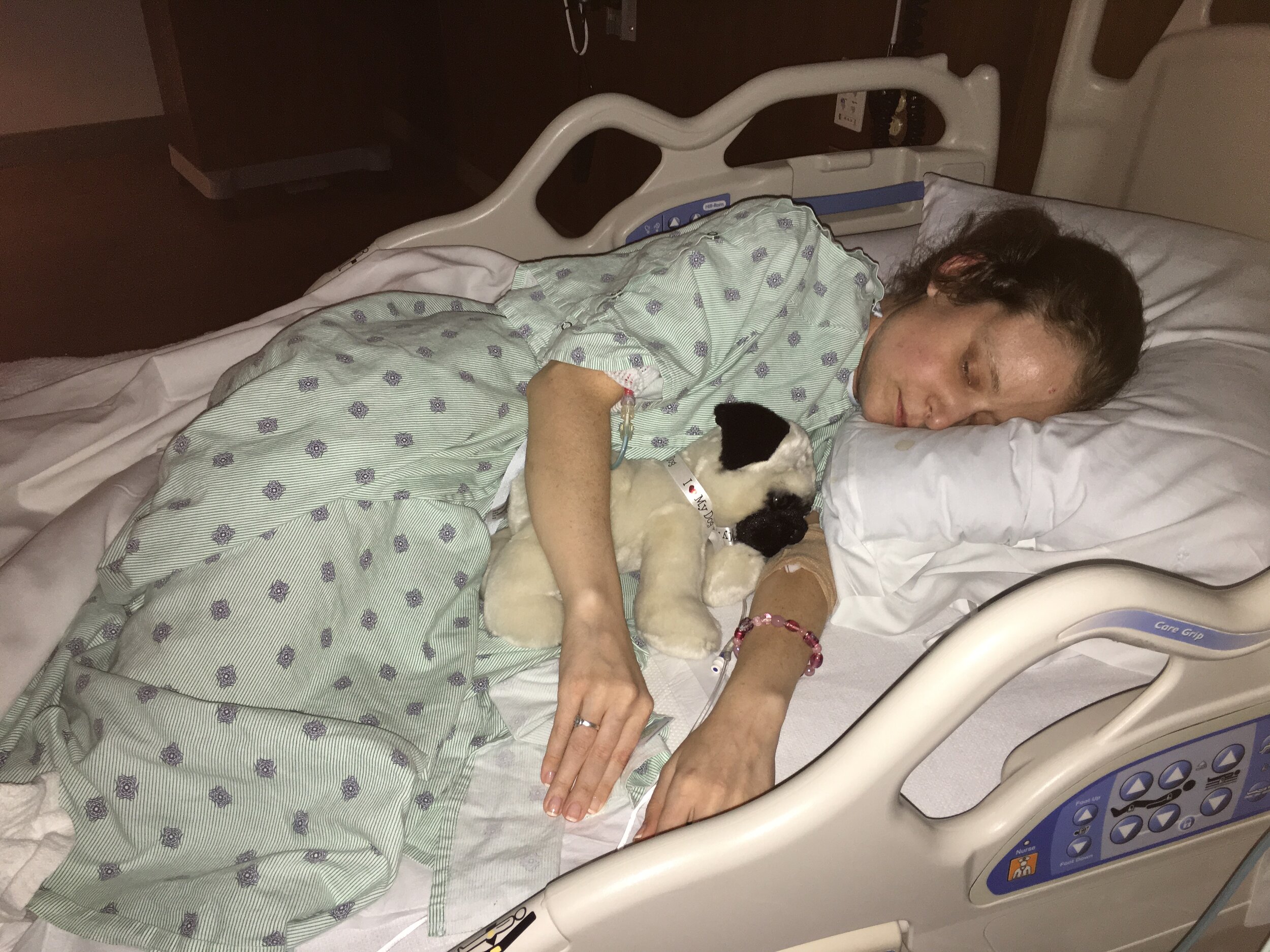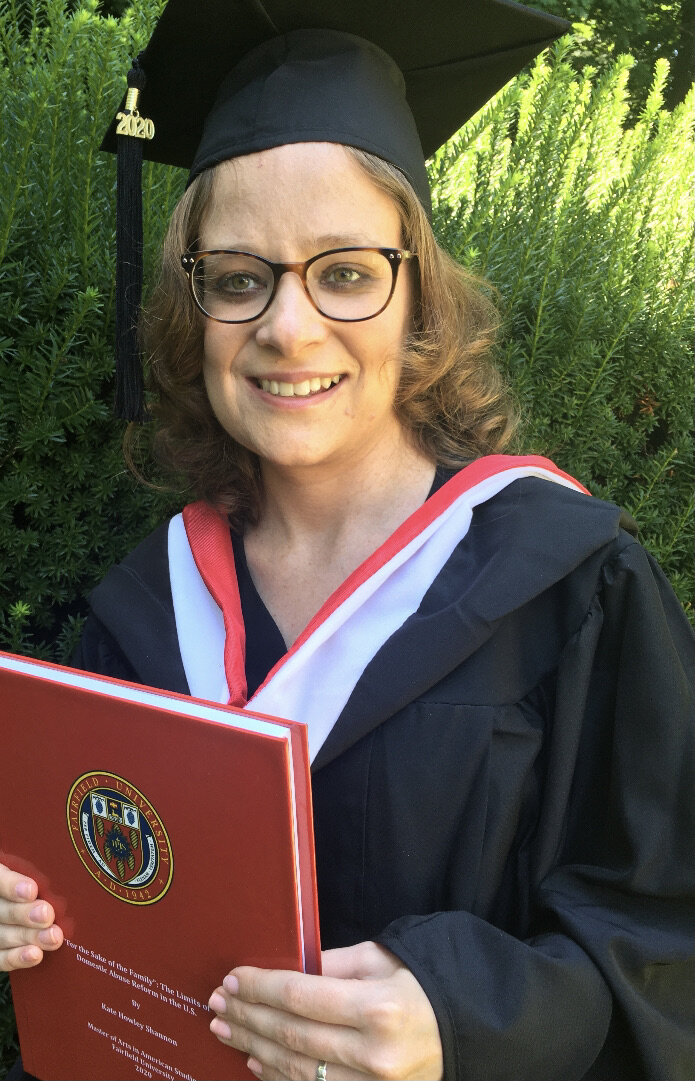College | Coping | IBD

The blogger rests in a hospital bed during a flare.
“I could add an independent study for the fall semester and then cram my thesis and final course into the spring semester. It would be overwhelming for sure, but I would graduate on time.” I sat in my hospital bed attached to wries and beeping machines that made running to the bathroom every couple of minutes an arduous task. But, my thoughts were not in that room. My brain was in a reboot phase, trying to calculate how I would make up for the summer session I was missing. My body could not derail me!
My doctor must have sensed my tenacity because he advised me to take it easy as we worked on finding a treatment to get me into remission. “Time is too precious to diddy daddle,” I thought a few weeks later as I submitted the form and payment to add an independent study to my already full course load.
Within days of hitting the ‘submit’ button, I was at the local hospital again wearing a “fall risk” bracelet and being wheeled into the all too familiar CT scan room. My IBD had intensified as soon as I began reducing my steroids. My physician pumped me up with ‘miracle drugs’ again to no avail. My weight started rapidly declining, and my energy went down the drain. Taking a ten-minute seated shower became an arduous task that left me feeling like I had run a marathon (and I do not run!).
I began to panic. I weighed less than I had in 5th grade and anemia left me as white as the sheets in a hospital bed. My main concern: how would I graduate on time? How would I continue affording graduate school when I could no longer work full-time?
There is an old saying that “if we don’t learn from our history, we are doomed to repeat it.” Well, I guess I was not applying my graduate studies in history beyond the classroom because I persisted in making rigid plans to graduate ‘on time.’ Heck, I thought as I struggled to take a shower, I will just move my independent study to the spring, finish it in a few weeks, and then write my thesis in the last few months of the semester. I knew it would be challenging, but I needed to push myself. This illness was just another obstacle to overcome in a life of hurdles. I refused to let it derail me.

The blogger holds her MA thesis. She is standing in front of a green bush.
The Spring semester came, and biologics gave me some relief in my IBD symptoms. Nevertheless, my body remained tired, and my mind was scattered. Simple tasks took forever. I spent hours sitting in front of my computer trying to string a few coherent sentences together. My doctor told me to be patient; I was still ill; my bloodwork was still off. My professor also encouraged me to take my time. She gently insisted that I could take as much time as I needed. She would give me an IC until I submitted my thesis so that I would not have to pay extra for an additional semester. This should have decreased my stress and allowed me to listen to my body.
But, the clock was ticking. I refused to go easy on myself. I sat in front of the computer, cursing myself for being so lazy and dumb. I taunted myself that anyone with half an ounce of willpower would be able to push through this.
So, I tried to push through. I could not. I started flaring again. My doctor kept increasing my dose of steroids and biologics, but my body was not responding. In the infinite wisdom of a historian, I decided to set another firm deadline for myself. I would give myself the summer to write a 125-page master thesis.
I remember struggling to fill out the paperwork while sitting on the toilet in agony. All I wanted to do was curl up in my bed. Once again, I berated myself for being such a pathetic little weakling who couldn’t just push through.
The next day, I went to the hospital for a CT scan and found myself in a bed surrounding my panicked doctors. I was admitted. In a few weeks, some friendly paramedics rushed me from my local hospital to NYC to have my colon removed in emergency surgery.
It would be nice to say that this was my wake-up call. I would love to wrap up this blog by explaining how I finally learned from my history and stopped pushing myself beyond my limits. But it was more complicated than that. I continued pushing myself until my body forced me to take a break. After every additional surgery, hospitalization, and complication, I rushed to get back to work on my thesis. Did all of this abuse pay off?
No.
When I submitted my final MA thesis project one year and six weeks later than planned, I realized that I could have completed it without the added strain on my body. The truth is, I wrote 99.9% of my paper when my symptoms were at bay. The other .01% (which probably took much longer) was written in a fruitless struggle against my body’s limitations. I did not accomplish anything other than a few crappy sentences during this time. Pushing myself did not help me achieve my goal any quicker. It merely put my body through unnecessary hell.
I wish that I could go back in time and tell myself I needed to take care of my health before I could climb academic mountains. There is nothing glorious about abusing your body by ignoring its screams. I hope that I have learned my lesson and that I can remain more flexible in the future.
In the meantime, I want to remind all my IBD and chronic illness warriors with big goals to work towards these goals while prioritizing your health. They might not go as planned, but you can get there at your own, beautiful pace.
